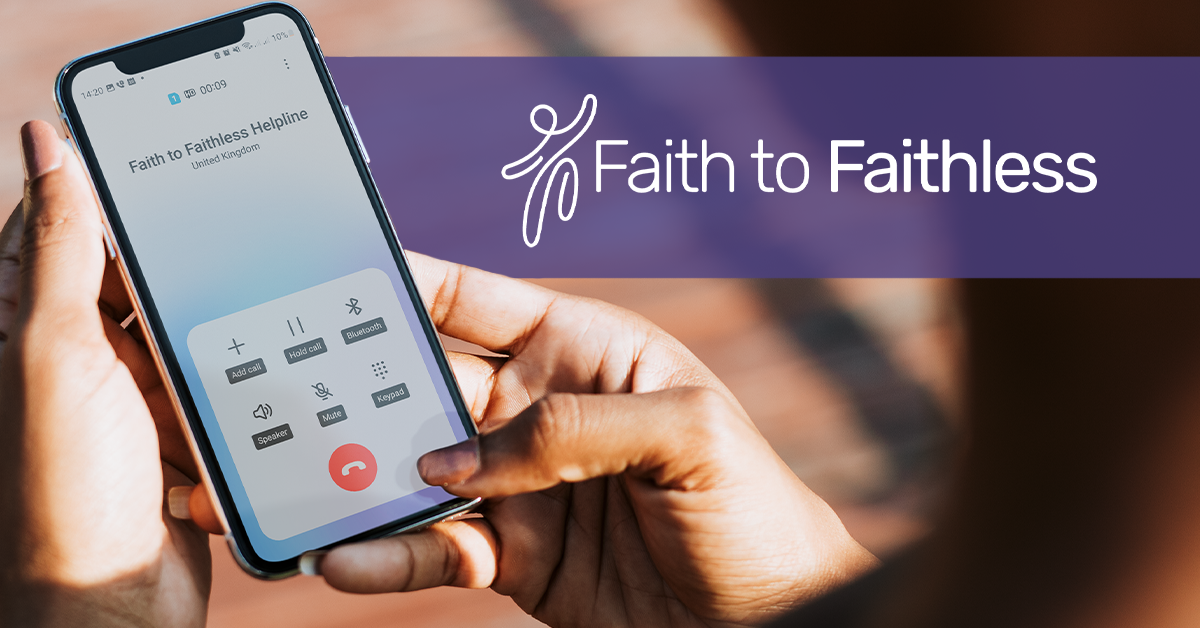
Since its launch on 21 February 2024, almost 500 people have received ‘life-saving support’ from Humanists UK’s pioneering Faith to Faithless helpline – the first UK-based phone service dedicated to helping those leaving high-control religious groups.
Operating three days a week, the helpline provides confidential emotional support to individuals navigating the often extreme challenges of leaving high-control groups. These groups exert profound influence over their members’ lives, curtailing their personal freedom, critical thinking, and emotional wellbeing.
Leaving such environments can be a monumental challenge, fraught with isolation, stigma, and a host of difficulties that can result in homelessness, violence, or any manner of abuse. Recognising the gravity of these challenges, Humanists UK’s Faith to Faithless helpline provides a safe, confidential, and empathetic space for individuals grappling with the complexities of leaving their religious communities.
The helpline, staffed by trained volunteers, most of whom have lived experience in transitioning away from high-control groups, provides emotional support, guidance, and resources. It acts as a primary point of contact for those seeking help, offering a listening ear, and advice on navigating the challenges associated with such a significant and often traumatic life change. The helpline provides practical advice on a range of issues, including building new social networks, accessing professional counselling, and navigating legal concerns that may arise from leaving a high-control group. This approach is aimed at empowering ‘apostates’ to rebuild their lives with confidence and autonomy.
The harrowing realities faced by callers
The largest single group of callers to the helpline were ex-evangelical Christian experiencing abuse or shunning from within their own families or the wider evangelical community, but other callers frequently included ex-Muslims, ex-Jehovah’s Witnesses, ex-Charedi Jews, and former members of smaller cults and other religions.
The most common types of experiences described include emotional and psychological abuse, which was reported by the vast majority of those seeking support. Many callers described manipulation, coercion, and control within religious environments, often leading to profound distress, anxiety, and long-term trauma.
Physical abuse and threats of violence – both against individuals and their families – were also significant concerns, with some callers fearing for their safety after leaving or questioning their religious beliefs. Additionally, financial abuse was a common issue, where individuals had been coerced into financial dependency or had resources withheld as a means of control.
Other issues raised by callers included stalking, forced or coerced marriage, homelessness, restrictions on education, and access to children issues. Reports of sexual violence, conversion therapy, and ‘exorcism’ highlight the extreme experiences some individuals face when attempting to leave high-control religious groups.
Real people, real struggles, real stories
The helpline provided vital support for people like Anna, who was able to speak to a volunteer in her first language, Arabic. Isolated in her area, she didn’t know anyone who wasn’t religious. The helpline volunteer arranged for her to be referred to Faith to Faithless peer support sessions, where she could connect with others who shared her experiences. Anna said she had never been given the opportunity to talk about her journey in her own language before, and she found it both empowering and reassuring.
And people like Ray, who grew up in an incredibly controlling evangelical Christian community. He spent years on missionary trips with his family, but now struggles with the realisation that he does not believe in a god. The weight of living ‘a double life’ has left him battling depression and anxiety. The few people he has confided in dismissed it as a ‘phase’ and warned him that if he doesn’t ‘get over it,’ he will be ostracised.
And Paul, who left a new-age ‘Buddhist’ cult and felt suicidal after being excommunicated by the community. He was being stalked by members of the group and lived in constant fear of what might happen if he went to the police.
And Jane, who was abused as a child in an evangelical Christian church. She shared the deep shame and anger she still carries. Despite leaving more than a decade ago, she remains terrified of hell and eternal punishment. She struggled to form turst in friendships since being shunned.
Feedback from service users has been glowing, with many expressing that they felt their problems were being heard and taken seriously for the first time. This included comments such as ‘Your support is a life saver… I am still quite struck to have encountered such a world of empathetic perspective and awareness… it helped me so much’.
Humanists UK Director of Humanist Care Clare Elcombe Webber said:
‘We are incredibly proud to have been able to offer this service, based on growing demand from our community. We know how vital it is for people to be able to connect with someone who understands how difficult and unique the journey away from controlling religion can be, and we are excited to be able to keep growing the helpline and all our other support services.
Since it was founded in 2015 Faith to Faithless has directly supported thousands of apostates while amplifying their voices to drive policy and political change. I’m incredibly proud of the volunteers and staff whose dedication has made this possible, creating a lasting and positive impact on the lives of people like Anna, Ray, Paul, and Jane.’

Faith to Faithless helpline
The Faith to Faithless helpline is a groundbreaking service dedicated to supporting people who have left high-control religious groups. So called ‘apostates’ often deal with social isolation, mental health issues, discrimination, and estrangement from their communities and families. The helpline, operating three days a week and staffed by trained volunteers, offers bespoke assistance, resources, and empathetic support to a diverse group, including ex-Muslims, ex-Jehovah’s Witnesses, ex-evangelicals, and ex-Mormons. It aims to bridge the gap in understanding and support for apostates, providing a crucial lifeline for those navigating the complexities of leaving high-control religious environments.
Calls are free from all mobiles and landlines and won’t appear on itemised bills.
Wednesday 10:00 – 13:00
Thursday 16:00 – 19:00
Friday 08:00 – 11:00
Freephone: 0800 448 0748
You will also be able to email helpline@faithtofaithless.com for support, and emails will be replied to during our usual opening hours.
Notes
For further comment or information, media should contact Humanists UK Director of Public Affairs and Policy Richy Thompson at press@humanists.uk or phone 0203 675 0959.
Faith to Faithless has been a programme at Humanists UK dedicated to providing specialist support to apostates since 2015. Beyond the helpline and its year-round provision of peer support from trained volunteers, the service offers awareness training to public services, including NHS divisions and police forces.
Faith to Faithless operates under a stringent safeguarding policy, prioritising the safety and wellbeing of all those reaching out for support. faithtofaithless.com
Read our interviews with our ‘Helpline heroes’ Lya and Iacopo
Humanists UK is the national charity working on behalf of non-religious people. Powered by over 130,000 members and supporters, we advance free thinking and promote humanism to create a tolerant society where rational thinking and kindness prevail. We provide ceremonies, pastoral care, education, and support services benefitting over a million people every year and our campaigns advance humanist thinking on ethical issues, human rights, and equal treatment for all.
